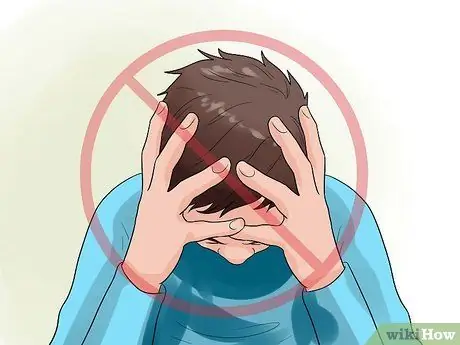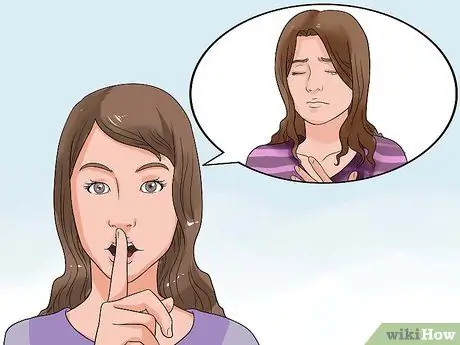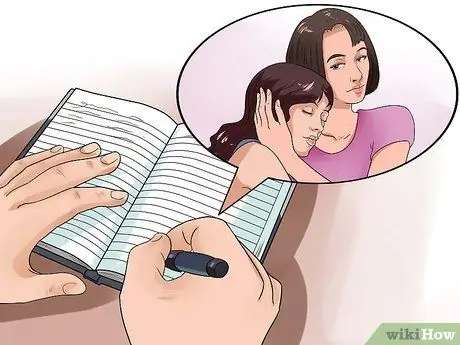- Author Jason Gerald gerald@how-what-advice.com.
- Public 2024-01-19 22:11.
- Last modified 2025-01-23 12:04.
Most people feel confident in some situations, but that confidence is lost in others. Maybe you feel confident in school because your grades are good. However, if you're at a party, you feel like a fish caught in a net and turn shy and clumsy. It may be that you feel confident when hanging out with your classmates, but lack self-confidence in a work environment. Whatever the reason, there may be situations in which you feel you need to boost your confidence. Acting confident is a step towards building confidence. You can achieve this by making some changes in the way you see yourself and the way you behave.
Step
Method 1 of 4: Imitating Confident People

Step 1. Look for confident people you can imitate
Think of people you know who have high self-esteem. These people can be models for confident action. You can choose your parents, teachers, or even celebrities. Observe the person's behavior, speech and body language. Imitate this behavior until it merges with you.

Step 2. Smile often and be friendly
Being friendly to others and smiling makes you appear confident. People will believe that you are a fun and happy person and like to hang out with other people. As a result, they will be attracted to be near you.
- Participating in various activities will give you the opportunity to be friendly and show confidence.
- When introduced, state your name. This will give the other person the impression that you respect yourself and deserve to be heard when you speak.

Step 3. When speaking and listening, do it right
Confident people don't over-talk, ramble, or spit. They speak properly and listen to what others have to say, engage in conversations according to prevailing social norms.
- For example, don't talk about yourself all the time. If you keep talking about your accomplishments, people will start to think you're looking for approval and recognition. Confident people don't try to seek outside approval. Instead, try asking about other people's accomplishments and lives!
- Accept compliments graciously. If you get positive feedback, say thank you and take the compliment. Confident people know that they deserve praise and respect. Don't reproach yourself by saying that you're not good at something, or acting like your success was just luck.

Step 4. Have confident body language
Confident people usually don't appear anxious or nervous. Making adjustments in your body language can convey a sense of confidence, even if you feel otherwise.
- Stand with your back and shoulders straight.
- Make eye contact when talking to someone.
- Don't show anxiety.
- Release the tension in your muscles.

Step 5. Shake the other person's hand firmly
When you meet new people, make eye contact and shake their hands firmly. This will give the impression that you are a confident and interested person.

Step 6. Speak earnestly and clearly
Speak your words in a clear and confident voice. If your voice is timid and unsteady, you're not giving the impression of self-confidence. If you speak words hastily, you are conveying the message that you don't expect people to hear you.
Try removing words like "em" and "ng" from your vocabulary

Step 7. Dress confidently and appropriately
People often make instant judgments based on a person's appearance. Sometimes, acting confident means you have to have the right appearance. If you wear clothes that make you look like you just woke up, people usually don't take you seriously. On the other hand, if you look like you're ready to get things done, people will think you're confident and tend to show more respect.
Trying to take your appearance seriously will result in your demands being taken more seriously

Step 8. Say what you want to say
Don't let other people do the talking for you because then they will take advantage of you easily. By telling yourself what you want to say and showing others that you would not accept being treated without respect, they will see your confidence and show you the respect you deserve.
For example, if you're trying to talk and someone interrupts, say, "Sorry, I just wanted to finish what I wanted to say."

Step 9. Don't criticize yourself in front of others
People tend to treat you as well as you treat yourself. If you are always self-deprecating, others will start treating you that way. By having respect for yourself, you can show that you will not accept being treated as inferior to others.
For example, don't tell people that you really hate your hair. Look for something in your appearance that makes you feel proud and focus on that. Or, change your haircut and turn a negative self-image into a positive one

Step 10. Imagine you are in a different situation
If you're having trouble being confident in one situation, just imagine being in a different situation that made you feel confident. For example, you don't have a problem talking to other people at school, but you keep your mouth shut when you start a conversation at a party. So when you're at a party, imagine you're having a conversation with someone in class.
Fight the negative thoughts that run through your head at a party by convincing yourself that you also have social skills and can talk easily in other situations

Step 11. Give praise to others
In addition to seeing themselves in a positive light, confident people also recognize positive qualities in others. If your co-worker has done a great job and won an award for his accomplishments, congratulate him with a smile. Give praise to others for small and big things. This action will make you appear confident in the eyes of others.

Step 12. Take a deep breath
Begin to calm your body by turning off the fight or flight response. Even if you don't feel more confident right now, taking deep breaths can calm your body down.
For example, if you're feeling nervous about going into a job interview, activate your body's calming response by taking ten deep breaths: inhale for a count of four, hold your breath for a count of four, then exhale for a count of four. Your body will become more relaxed, which can help make you appear more confident

Step 13. Also, never talk about other people behind their backs
Some people may suggest you be mean to other people to be popular. However, this suggestion is completely unfounded. Badmouthing others is never part of self-confidence.
Method 2 of 4: Practice to Act Confident

Step 1. Communicate decisively
Communicating in an honest, straightforward manner will help make you confident in any situation. Strict communication helps ensure that everyone's rights, both speakers and listeners, are protected. In addition, assertive communication also ensures that everyone who wants to take part in the conversation understands that they must cooperate. It also means everyone's opinion will be taken into account when looking for a solution.
- For example, if you want to act confidently during an interview, you might consider the interview an opportunity to see how your work experience and knowledge can contribute to meeting the needs of the company. You might say, “Based on your description, one of the skills you need is to help expand the use of intermodal rail services from existing clients. In my position at ABC Transport, I was able to help three of the largest national clients expand their use of intermodal rail services, generating an additional ten billion in revenue for the company. I want to do the same, even more, for XYZ Intermodal.”
- You'll appear confident in front of potential employers because you've managed to convey your past accomplishments in a factual way, and don't sound arrogant. Additionally, you convey your enthusiasm for being part of the team.

Step 2. Make a firm decision
When you have to make a decision, don't be swayed by the choices. Be decisive and firm, and stand by your decision.
- It could be something as trivial as deciding which restaurant to go to for dinner. Don't think about it too long. Just pick one restaurant and have fun.
- If the decision involves something important, such as accepting a new job, you can spend more time weighing the pros and cons of the decision. Just make sure you don't weigh in too long.

Step 3. Work hard
Turn the energy that makes you nervous into something productive. Shift your focus to work hard. Confident people don't hesitate to take steps that will lead them to improvement because what they do doesn't affect their opinion of themselves. They know that they will always do their best in every situation, so they will be confident even if they make mistakes.

Step 4. Don't give up easily
Confident people don't give up easily in any situation. Instead, they will keep trying until they find a solution or a way to achieve success. If you want to be confident, don't slack off when you encounter a problem or challenge.
Method 3 of 4: Building Confidence from the Inside Out

Step 1. Believe in yourself
The best way to be confident is to feel confident. There are several things you can do to help increase your confidence and self-esteem, which in turn will help you feel better in many situations. Believing in yourself is the secret to self-confidence. While you can be confident, your attitude will be much more convincing if you believe in yourself. Look deep within yourself and acknowledge your best qualities. Maybe you don't feel like you have something special about you, but you actually do. This confidence in yourself naturally makes you feel and look great.
- Set realistic goals and achieve them. Trust yourself to know that you can achieve those goals successfully.
- Love yourself as you are. Accept your strengths and weaknesses. Give yourself leeway if you make a mistake and reward yourself when you succeed.
- Talk to people you care about. People who love you can help you see the positive in yourself. They love you for a reason, and their influence will have a positive impact on your self-esteem.

Step 2. Make a list of all your positive qualities
To be confident, shift your focus to things that build confidence. Think about your positive qualities. Consider the things you did well and succeeded (however big or small). write down all the positive things you can say to yourself. Examples are as follows:
- I'm a great friend.
- I'm a hard working employee.
- I excel at math, science, spelling, grammar, etc.
- I won the trophy for the chess championship.

Step 3. Remember the nice things people have said to you
Remember in what situations people gave you compliments. This will help make you think positively about yourself, which in turn will help you be more confident.

Step 4. Find out what makes you confident
Once you understand what situations you feel confident in, you can transfer this self-confidence-generating ability to other situations.
- Write down every situation that makes you feel confident. For each situation, write down what things can make you feel confident when you are in that situation. For example: “I feel confident when I'm with my friends. The reason I feel confident: I've known them for a very long time. I know they won't judge me. They accept me for who I am.”
- Write down every situation where you don't feel the same way. For each of these situations, write down what is keeping you from feeling confident. For example: “I don't feel confident when I'm at work. The reason I don't feel confident: It's a new job and I'm not sure how I'm doing so far. My boss is a chomp, and he's criticizing the work I've done."

Step 5. Focus on improving yourself
Another skill you can hone is trying hard to succeed at what you do at work, school, or even in your relationship endeavors. All depends on the focus. Confident people focus on finding ways to improve what they are doing until they succeed. People who are insecure will focus on what other people think of them, worry about what they see as flaws (which is often not true), and worry about failure instead of trying to figure out how to make things work.
Reflect on a recent situation that involved you, such as public speaking or a job interview. Count at least three things that went well in the situation. This will help prevent the entry of negative thoughts

Step 6. Silence internal criticism
Many people suffer greatly from negative thoughts. Negative thoughts often come from self-confidence that is not necessarily true. These types of thoughts can include, “I'm not good enough,” “I'm unlucky,” or “I always mess things up.”
- Accept it when such thoughts arise. Bad habits can form in the course of your life. You can change that habit.
- Fight negative thoughts. If that thought comes up, counter it with a positive thought and test which one is correct. For example, if you find yourself saying, "I'm unlucky," counter that thought with all the things you have that make you lucky. For example, remind yourself, “I have shelter, have food, and wear clothes. I have friends and family who love me. I won a lottery of IDR 500,000 last year.”
- Admit that self-criticism is never completely accurate. Silencing this inner critic can make you feel more confident because you will feel more confident without someone (yourself) criticizing you all the time.

Step 7. Believe in your ability to face challenges
You can use a list of positive things you have to increase your belief that you will be able to face challenges and do your best in any situation.
If you're always thinking about the mistakes you've made, your “empowerment” (the belief that you can actually get things done big and small) will decrease. As a result, these thoughts will erode your confidence and cause you to act less confident. Therefore, believe that you can overcome the challenges
Method 4 of 4: Taking Care of Yourself

Step 1. Celebrate your personality
There may be things you want to change in yourself. But you still have to accept yourself as you are before you can initiate change. Don't compare yourself to others. Try not to worry about what other people think of you. Learn to go your own way and do what you want to do.

Step 2. Do something that makes you feel strong
Achieve something in life that you have always wanted to achieve. Take a course, join a club, or do something else that you know you're good at. Achieving something that makes you feel strong will improve your self-confidence.

Step 3. Write a journal
Every day write down something that makes you proud, whether it's a good deed towards someone or a positive quality you've just discovered in yourself. Whenever you need to boost your self-confidence, reread the journal and remind yourself of the great qualities you possess.

Step 4. Maintain good relationships with loved ones
Take time to enjoy being with the people you love and care about. Surrounding yourself with supportive people will help build confidence in many situations. The people in question include family, friends and spouses.

Step 5. Maintain a healthy lifestyle
Take care of your body so that you feel good about yourself. When you feel good about yourself and your body, you will feel more confident. This will help you be more confident.






